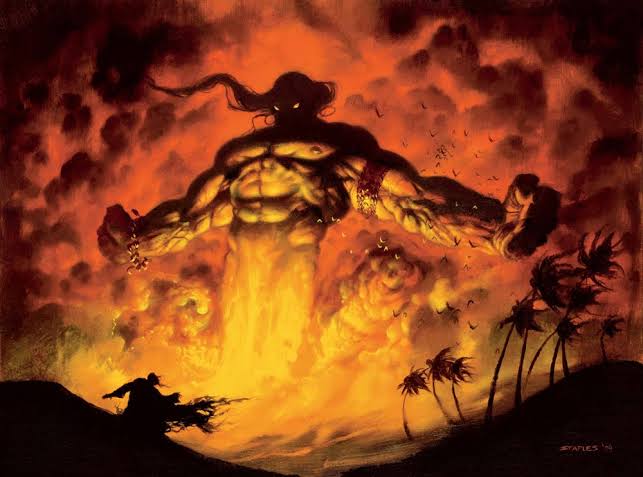
Place of Origin: Arabia
Fear Rating: 6/ 10
‘Wishes?’ asked the jinn. It noticed the camel. Camel bones were good…
‘My three wishes!’ said Hasan. ‘You will grant me three wishes, won’t you?’
The jinn thought for a while. ‘Why?’ it asked.
‘That’s what jinn do! Don’t you know that? Everyone knows that!’
The camel took a look at the jinn. It started to run.
‘I don’t know what you mean.’ said the jinn. ‘Why would I want to grant you three wishes?’
‘I freed you! From the lamp!’ Hasan looked around wildly for his camel. It was gone.
The jinn had had enough of this nonsense. Freed him from his own lamp, indeed! It flew up in the sky, caught up with the running camel and ate it.
Aaaaah, fresh camel. Very good.
It was still hungry.
It looked around, found Hasan, wide-eyed and trembling, trying to hide behind a dune, and ate him too.
Why? Why had he wanted wishes? He was quite juicy though.
Then it found the lamp – The handle was sticking out of the swirling sand—and flew inside. Time for a nice nap.
The dunes shifted again in the howling sandstorm. Sand covered the beautifully carved golden lamp.
Inside it the jinn was having trouble sleeping.
What wishes? Why wishes?
Another, very disturbing thought struck the jinn and kept it awake for a long time.
Why three?

That’s an excerpt from one of my favourite books – The Simoqin Prophecies, Book 1 of the Gameworld Trilogy. It perfectly sums up the lack of understanding we have regarding the entities known as jinn. Stories like ‘Alladin’ & ‘I Dream of a Genie’ have over-romanticized Jinn as Genies and have shown them to be benevolent, all-powerful wish granting entities. There are quite a few other myths regarding jinn that are propagated by the West which have no basis in the original Arabic / Islamic folklore.
The origins of Jinn can be traced back to pre-Islamic Arabia. However, after the advent of Islam, they got assimilated into Islamic culture. Angel, demons & jinn were concepts adapted from other sources into Islam. In Islamic sense, Jinn are invisible entities & God created them before Adam out of “smokeless fire”. They exist alongside humans, living mainly in desolated and barren places & are considered to be stronger & faster than humans. Just like humans, jinn are both male & female, they eat, sleep, procreate and have free will to choose between good and evil. However, in later revelations, the words jinn and demon came to be used interchangeably as such indicating them to be purely evil.
In pre-Islamic folklore, it is said King Solomon was in possession of a ring which gave him control over the jinn. He used this power to build the Temple of Jerusalem and much of the city as well. ‘The Ring of Solomon’ a novel by Jonathan Stroud explores this topic in an alternate history/ fantasy setting. It is also a prequel to the Bartimaeus Trilogy, a fantasy series which explores the thought process of jinn and their relationship with humans in a light & funny manner.

However, in modern times, jinn are mainly thought of as evil and malevolent creatures who are widely feared across the Muslim population. According to a study, more than 80% Muslims across Middle East, Africa & South East Asia believe in the existence of jinn. One cannot fully understand the terror the word ‘jinn’ invokes unless one has grown up listening to the stories about it as portrayed in the Muslim culture. Just as a ‘Skinwalker’ is to the Navajo, a ‘Chudail’ is to Hindus, similarly a Jinn is to Muslims. The terrifying nature of this creature is fully explored in the Bollywood movie ‘Pari’ (a film which I will review later this week) where they showcase satanic cults performing heinous acts like child & human sacrifice as worship to an Ifrit/ Jinn.
Jinn are believed to be capable of possessing and haunting humans. Just like a ghost’s possession, people have to go undergo various exorcism rituals to get rid of a jinn’s possession. Jinn are amorphous creatures and they can take the form any animal or humans. One of the basic identifying features of the jinn are its glowing red eyes. An Ifrit or Afarit or Efreetare upgraded jinn—basically they are much stronger and more powerful than normal jinn. Luckily for me, I learnt this fact at a very young age through an interesting game called Heroes of Might & Magic 3. I knew very well the meaning of the words Jinn & Efreet which helped me stay away from them, unlike Hasan.

As per the Quran, Satan/ Shaytaan refused to prostrate before Adam even though it was God’s command. Therefore, God had to banish Satan and he was sent to Earth as the King of jinn. Satan was given the name of Iblis, the equivalent of Devil, and his followers, the jinn were labelled as demons. The throne of Iblis is in the sea.
Jinn have a much longer lifespan spanning over many centuries. This, coupled with the fact that they are stronger, faster and invisible makes it highly difficult for humans to have any chance of fighting back against them. However, it is said in the Quran that jinn or demons can only ‘Waswaas’ in the minds of men but have no control or power over true believers of God.
Just in case, if you encounter one, be prepared to either have a firm belief in God or in case you’re an atheist or something, pray that jinn is the atypical ‘Disney genie’ rather than the typical ‘Samit Basu Jinn’
Disclaimer: I am not sponsored by either Samit Basu nor Jonathon Stroud or by Ubisoft—the makers of Heroes of Might & Magic 3 (though I wish I was). These are genuine recommendations as I’ve grown up loving them immensely and can’t help but spread the word about them around.